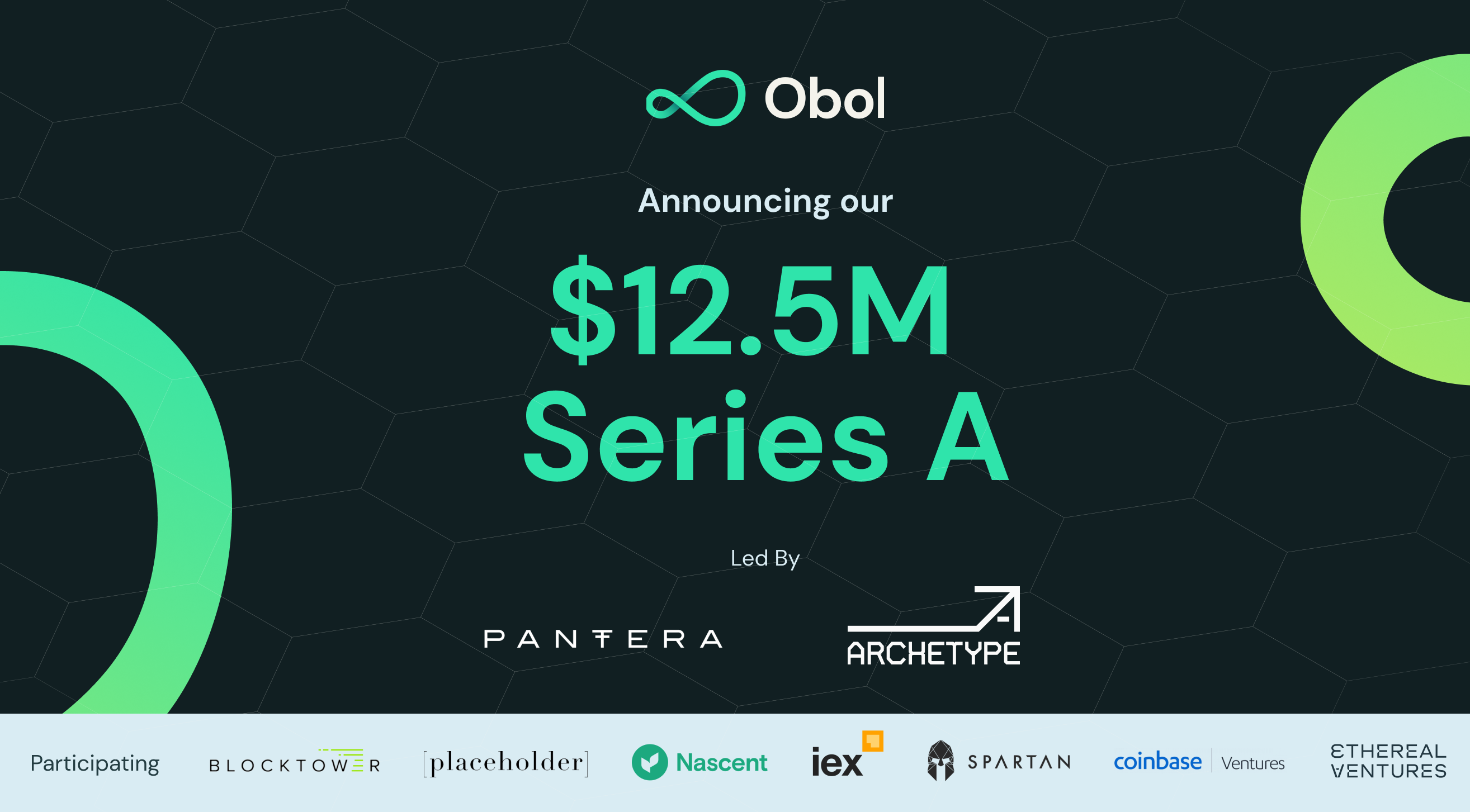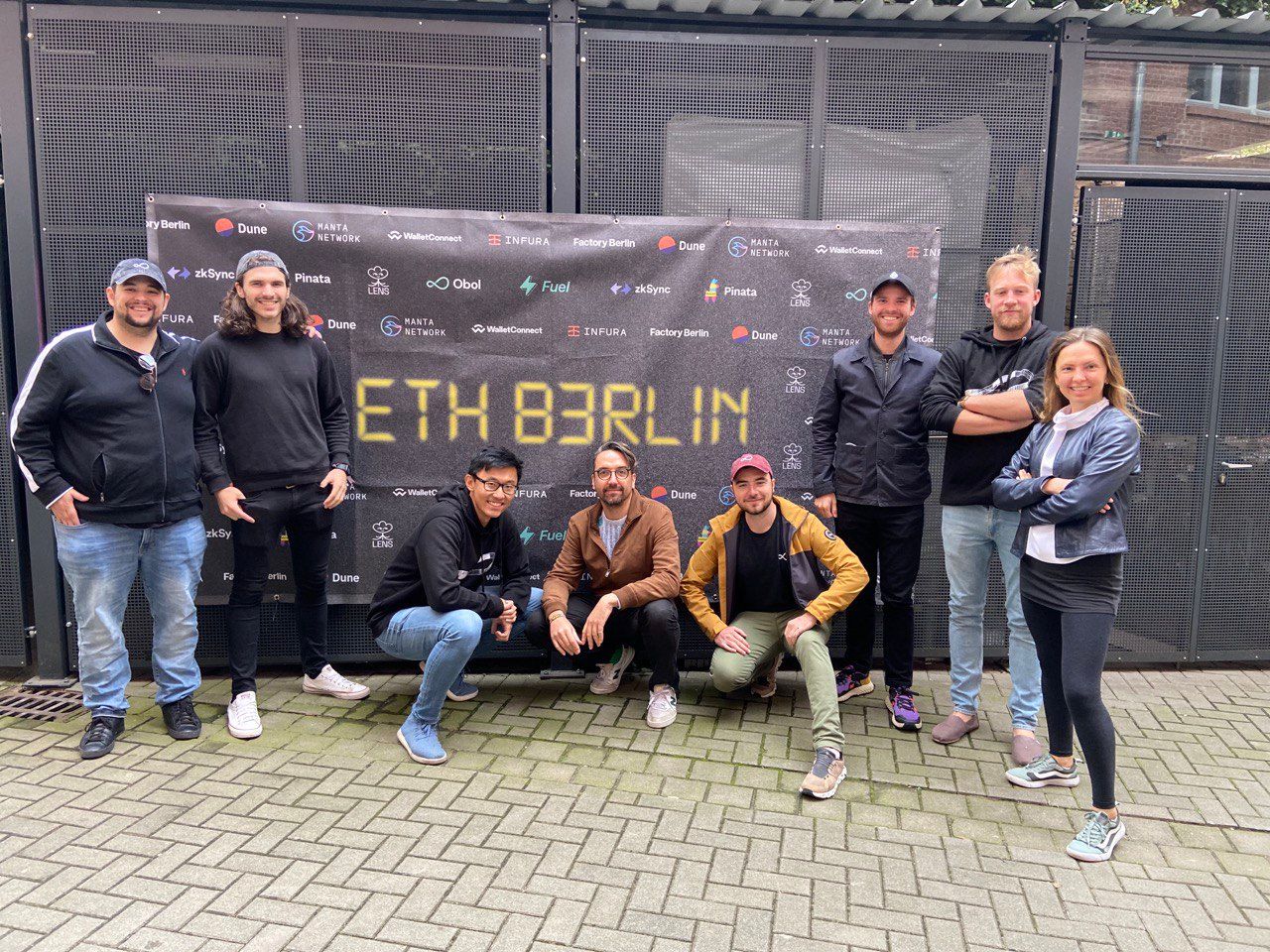Obol Raises $12.5M to Decentralize Ethereum Staking Infrastructure
Why we're excited about the future we can build together with the community to usher in next generation of staking.

Today we are excited to update the community on our $12.5M Series A fundraising round. The round is co-led by Pantera Capital and Archetype with participation from Coinbase Ventures, Nascent, BlockTower, Placeholder, Ethereal Ventures, Spartan, and IEX. We also had direct participation from top validators such as Stakely, Cosmostation, Kukis Global, Swiss Staking, Swift Staking, a41, Blockscape, and DSRV.
At Obol, our goal is to advance the decentralization of Ethereum's validator ecosystem by building a sustainable protocol and ecosystem for distributed validators. The capital will be used to advance the development of Distributed Validator Technology on Ethereum, grow the core team, and explore scaling solutions for future ecosystems such as Ethereum L2’s and Cosmos. The successful completion of this round brings our total funding to date to $19M.
To all of our supporters, old and new, we appreciate you taking the time to help us grow the project. Completing the raise during these trying times, when funding seemed to disappear overnight, validates the importance of Obol for the next generation of Web3 scalability. The grass roots origin of the project remains and will continue to thrive with our new group of supporters. We look forward to continuing to work on hard problems and collaborate with the industry's top minds.
The Importance of Distributed Validators
Why do distributed validators matter, you might ask? Decentralization, after all, is the core mission and struggle of the Ethereum community. Without it, there is no mission and therefore no problem to solve. Network growth cycles that advance Ethereum's mission also create paradigm shifts that require new software and technologies to be researched, built, and adopted.
Distributed validators enable an Ethereum validator to be run simultaneously across a collection of machines over the internet. This is achieved by combining different cryptographic primitives such as distributed key generation, threshold signing, and BFT consensus algorithms.
DV’s were invented to push Ethereum validators towards the ideal end game, trustlessness. To give you an idea of the spectrum, if we were to call a trustless validator a 10, I would call where we are today as a 1. Despite finally having distributed validators running on testnets and (soon!) mainnet, this research effort has some legsss!
After a restful holiday season, the Obol core team is excited to show the community what we have planned for the next two years! Our north star this year is simple…. distribute all the validators!

What Have We Learned
Over the past 18 months we have grown the project wildly, scaling the core team from 2 to 22 and the community from a handful of individuals to tens of thousands. Over this time we have been focused on pushing Obol technology to the limits and testing it in a variety of contexts. Below, I will share our largest areas of focus and milestones of our most interesting findings.
1. Liquid Staking Protocols
One of the first adopters of DVT are liquid staking protocols 💦, with @stakewise_io, @LidoFinance, and others publicly stating their commitment to the tech.
— Obol Labs (@ObolNetwork) November 16, 2022
Some details on what problems & benefits DVT has for #liquidstaking. 👇🏻https://t.co/FXbhc0oegx
Why is DVT important for LSPs?
- DVT lowers operator slashing risk
- DVT enables increased operator performance through high availability
- DVT increases pool security due to the use of DKG
- DVT enables byzantine protection from operator set for multi-operator pools
- DVT allows LSP’s to decentralize by lowering the risk associated with adding new or non professional operators
What is the current adoption status with LSPs?
Out of all segments of professional validators, we've seen the greatest interest and adoption from liquid staking protocols. Lido, the largest LSP in terms of share of stake, has actively tested Obol DVT and seen great performance (live Lido DV cluster). They've also actively supported the development of DVT through grants. Stakewise is developing their next version, Stakewise V3, with DVT at the core of how they plan on decentralizing their offering. Others, like Swell Network, have put DVT on their roadmap as a core protocol feature in 2023.
2. At-Home Validators
🤗I am very glad to be a part of the @ObolNetwork
— MCiB🛸 (💙,🧡) (@KirillKilin) October 14, 2022
Athena #testnet together with the ObolUkraine team.
Together to the Moon 🚀.#Web3 #web3community #obol #ETH pic.twitter.com/f2zKdRphSn
Why is DVT important for at-home validators?
- DVT enables increased performance without increased risk
- DVT enables enhanced security for validator set up
- DVT enables more forgiveness and peace of mind
- DVT enables multi infrastructure fault tolerance
- Run remaining key shares in the cloud to protect against machine or connection failure
What is the current adoption status with at-home validators?
Over the past few months, we've seen incredible interest from the at-home validator community to take part in testing and maturing DVT. Over 5000 participants took part in our first testing program, Athena, resulting in 100+ DV clusters on Goerli running across the globe. Many of the clusters ran with performance similar to much larger institutional validators. We've also built an engaged community of 9000+ members in our public Discord. With our goal of getting to Mainnet this year, we are continuing our next phase of testing with the upcoming Bia testing program. So far, we've had 25000+ pre-registrants (!!). At-home validators will play a massive role in the future of DVT, and in turn will benefit from being able to run highly available, resilient DVs around the world.
3. Institutional Validators
Why is DVT important for institutional validators?
- DVT lowers infrastructure costs at scale
- DVT increases operational excellence and best security practices
- DVT may decrease insurance premiums for slashing protection
- DVT offers the most secure highly-available configuration for competitive markets
- Global tax research of distributed validators
What is the current adoption status with institutional validators?
We are at an inflection point for DVT adoption with institutional validators. In addition to the participation and support in the round, institutional validators are actively testing Obol DVT in their environments. Many are also publishing research on the technology, like Figment's recent article on DVT. With the growing interest, analyst firms like Messari are also investigating the technology and educating the market.
4. SME Validators
Why is DVT important for SME validators?
- DVT increases operational excellence and best security practices
- DVT offers the most secure highly-available configuration for competitive markets
- DVT knowledge and experience helps with LSP onboarding
- DVT transition offers new stakers and pooling opportunities
- DVT is a source of differentiation
What is the current adoption status with SME validators?
In order to improve resiliency and secure the network, many validators are actively participating in testing efforts for DVT. Today, we see 31 different validator teams in active multi-organizational DV clusters (Check them out here!). More than 50 organizations have signaled their interest and have initiated testing efforts. Finally, more than 70% of validators for the largest LSP, Lido, have onboarded with us.
4. MEV Researchers
Why is DVT important for MEV Researchers?
- DVT enables a new research field of MEV capture across distributed validators
- First multi-middleware technical implementation available for testing
- Heavy overlap in users (validators) and builders (devs)
What is the current adoption status with MEV Researchers?
Combining MEV with DVT is a critical step to creating a thriving middleware layer in Ethereum. Today, we are running MEV-boost enabled Distributed Validator clusters on Ropsten and Goerli testnets. Work is also underway with the client teams to align their MEV-boost registrations messages in a manner that allows the easy registration of distributed validators with an MEV-relay.
Join Us
As with any critical Web3 technology, you need good people who are passionate about building a decentralized future.

Obol is growing rapidly and seeking world-class talent to fulfill our mission of driving adoption of distributed validators across public blockchain networks. Obol is hiring across protocol development, QA, research, cryptography, design, and finance. Reach out to us if you believe in our mission and vision for the future of Web3! You'll be able to find all of our open positions on our jobs page. You can also directly reach out to our Head of People, @nannisack.
Back to Work
DVT isn’t just an Ethereum problem. It is a larger movement to minimize the trust associated with running critical infrastructure. Today, we are focused on the validator, tomorrow we may be focused on the prover, verifier, or sequencer. Solving for resiliency of these actors is what makes public blockchain networks permissionless and sustainable.
Addressing the problems of network decentralization, security, and resiliency will always be our north star. We’re excited to partner with Pantera Capital and Archetype, and we welcome a diverse group of investors who recognize that the push for blockchain decentralization is worth the capital!
Now back to building!!
